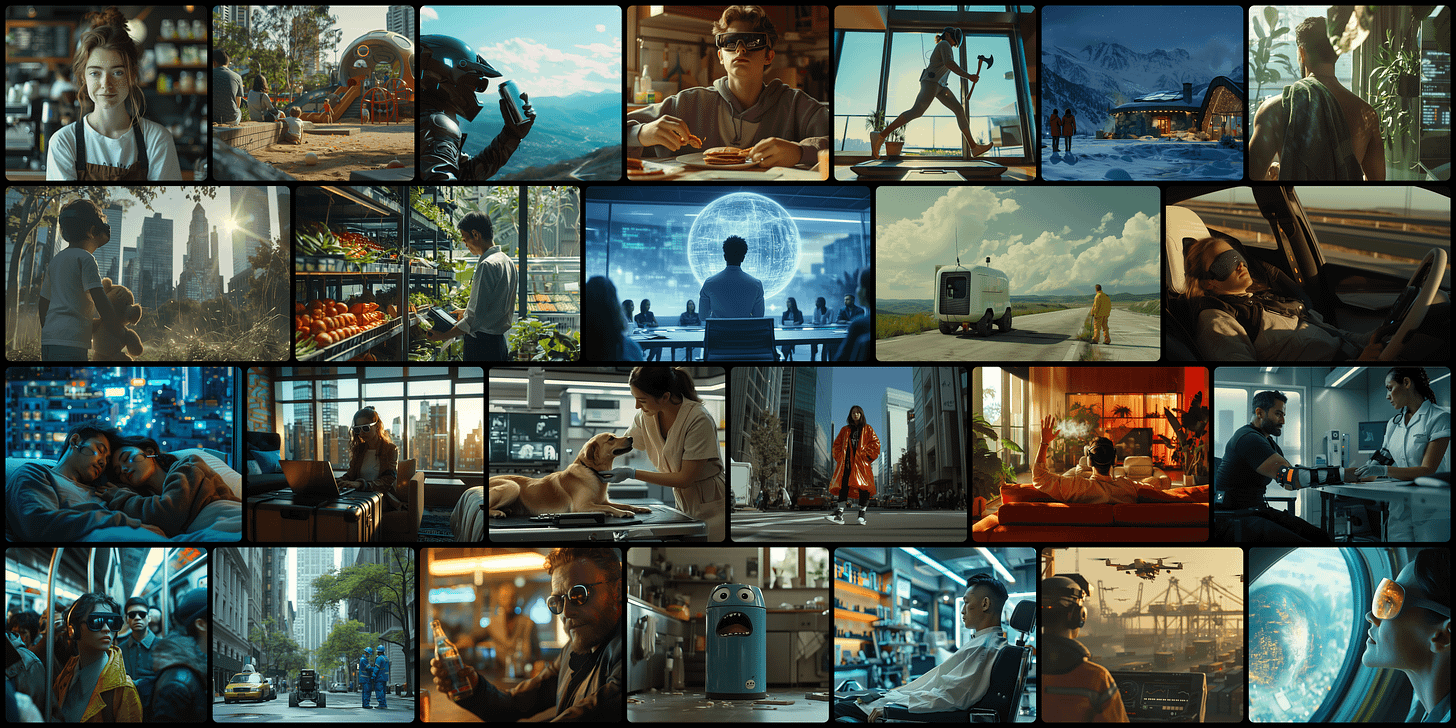- Thanks for stopping by. I'm still not sure why I had those soil sensors shipped to your house.
- Force of habit?
He smirks.
- You wish.
- You can order cool stuff to my place anytime. Thanks for the lunch. I don't know what was better: the lunch or sitting in your garden. This place is fantastic.
- These flowers pay for my parking.
- How so?
- One of the tax incentives for pollinator-friendly gardens. And the best part is that it’s a company benefit.
- So the plants are the benefit?
He glances at the plants, smiling proudly.
- More like the whole garden. It’s a smart living machine. Plus, plants are incredibly calming.
- And they can’t run away from you.
They share a smile.
- True. True. People surrounded by plants experience less stress, take fewer sick days, and get better at long-term planning. Gardening is productivity in disguise.
- You know? Your veggies may be worth more as data than food. Companies would line up to license the growth algorithms behind peppers that taste and look this incredible.
- How is that?
- This tastes amazing, and the stripes on those peppers look fabulous. You should check if a bigger producer is interested in taking your hobby to another level. It would be a waste if you’re the only person who gets to enjoy those.
- Hmm. I’m not sure about that.
- Not even trying is the only mistake you can't learn from.
- I’m not a gardener.
- You’re too humble. Those peppers are phenomenal.
He pauses, considering the idea.
- I know nothing about plants. I’m just a simple garden operator. This garden senses what plants need, and everything is automated.
- Like a botanical internet?
- Exactly, like the internet of plants. They communicate their needs directly, and the garden responds. If the plants get thirsty, the garden automatically turns on the sprinklers. Too much sun? The pergola pivots for instant shade.
A sharp ping from his watch interrupts their conversation, making him glance quickly at his wrist.
- See, the garden just texted me.
- Oh, what’s going on?
- Hmm, you'd better get going. A storm's about to hit. It predicts heavy wind, and I must strap the trees before the branches start snapping.
They get up, clearing the dishes.
- You know I won’t let it go this easy?
- Sure. I’ll think about it. Happy for a drink next week?
- A drink or a game?
- Why not both?
- Great idea. Let our schedules negotiate the best slot.
- Give everyone kisses from me.
- I will. See you soon.
He steps inside, glancing at the sky getting darker every second as the house windows subtly tint themselves darker for the storm.
Hello Practical Futurists,
Welcome back from the future, where tax incentives have turned private yards into eco assets, and environmental intelligence anticipates our needs before we do.
Hit the "Like" button at the top or bottom of this page to help other strategic thinkers build a future-ready mindset.Great leaders don't just think about the future. They experience it.
Like elite athletes who vividly visualize their performance, exceptional leaders build detailed mental pictures of possible futures to inform better decisions today.
Each week, our imagination workouts combine futures thinking and practical sci-fi, helping you build a personal library of future memories. These vivid mental scenarios transform abstract possibilities into clear reference points, sharpening your strategic instincts and enhancing your readiness for the age of AI.
Ready to expand your imagination? Here's a thought to start with:
Now, let's make this future personal.
We'll connect the ideas from this story directly to your life, turning abstract possibilities into practical memories you can use to confidently navigate tomorrow's challenges.
Personal life reflection prompts
1. Try to recall the first time you received a tax rebate for implementing a pollinator-friendly landscape in your yard: - How did you discover this incentive was available? - What specific changes did you make to qualify for the benefit? - How did this financial return change your perspective on environmental issues?
2. "Not even trying is the only mistake you can't learn from" challenges our fear of failure. What opportunity have you been hesitant to pursue, and what's the smallest step you could take towards it?3. Think back to a conversation where a friend recognised the commercial potential in something you considered "just a hobby": - What assumptions had prevented you from seeing this value yourself? - How did their outsider perspective illuminate possibilities you had overlooked? - What was the smallest first step you took toward exploring this potential?
4. How would your relationships change if technology could seamlessly coordinate your availability with others without the typical back-and-forth of scheduling?5. Try to recall the first month of using algorithm-assisted scheduling for social interactions: - How did the quality of your social connections change when scheduling friction was removed? - What unexpected patterns emerged in your optimal meeting times? - Which relationship benefited most from this frictionless coordination, and why?
Fantastic work!
You're building an impressive collection of future-focused insights. Now, let's supercharge your thinking by adding powerful professional leadership moments.
How will you guide your team or organization through the future you've just envisioned? Let's create memorable leadership experiences together.
Professional life reflection prompts
1. In what areas of your professional life could shifting your role from subject matter expert to systems orchestrator be valuable? How would this change your approach to leadership?2. Think about the transition period when your role shifted from hands-on expertise to systems orchestration: - Which responsibility was the most challenging to delegate to automated systems? - What new skill became unexpectedly valuable in your orchestrator’s role? - How did your ability to forecast and prevent problems change after stepping back from direct execution?
3. What operational data does your organisation possess that might be more valuable than the primary products or services you offer? How could this data be ethically monetised?5. Think back to the quarter when your company first monetised operational data that had previously been considered a byproduct: - Which unexpected industry partner approached you first about licensing this data? - What internal process needed to be revised to support this new revenue stream? - How did this additional revenue stream affect your core business strategy and investment decisions? - How did this change your team's perception of what constitutes your company's most valuable assets?
6. What 3 informal knowledge-sharing practices could your team implement to better surface hidden opportunities that might emerge during casual conversations?You did amazing! Excellent work!
Today's insights are valuable additions to your growing library of future experiences.
Thank you for expanding your imagination with us. Leaders with bold ideas move our world forward.
Think bright, and see you soon.
Pawel Halicki
Add your dose of Practical Futurism to your LinkedIn scroll
Connect with even more future-focused professionals.
Do you want stories like this in your inbox?
Join strategic imagination workouts that inspire change-makers in market-leading organisations, including Visa, Deloitte, Barclays, UEFA, Nielsen, Morgan Stanley, and many more.







